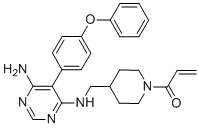Positive Late-Breaking Phase II Data Evaluating Investigational Oral Therapy, Evobrutinib In RMS.
Source: Merck Oct 30, 2018 6 years, 5 months, 3 weeks, 6 days, 15 hours, 33 minutes ago
Merck Today Announced The 24-Week Results Of The Phase II Study Of Evobrutinib In Patients With Relapsing Multiple Sclerosis (Rms) In Berlin, Germany.
Evobrutinib
- First Bruton’s Tyrosine Kinase inhibitor (BTKi) demonstrating clinical proof-of-concept in relapsing multiple sclerosis (RMS)
- Study met primary endpoint demonstrating significant reduction in Gd+ enhancing T1 lesions on MRI with evobrutinib versus placebo
- Clinically meaningful decrease in annual relapse rates observed
Merck, the vibrant science and technology company, today announced the 24-week results of the double-blind, randomised, placebo-controlled, 48-week, Phase II study of evobrutinib in patients with relapsing multiple sclerosis (RMS) at the 34
th Congress of the European Committee for Treatment and Research In Multiple Sclerosis (ECTRIMS) in Berlin, Germany. In this study, dimethyl fumarate (240mg BID) represented an open-label reference arm, and there were no formal statistical comparisons between dimethyl fumarate and evobrutinib or placebo. The study met its primary endpoint, with evobrutinib 75mg QD (once-daily) and 75mg BID (twice-daily) significantly reducing the number of gadolinium enhancing T1 (T1Gd+) lesions measured at weeks 12, 16, 20 and 24 in comparison to patients receiving placebo. Evobrutinib is a highly-specific, oral Bruton’s Tyrosine Kinase (BTK) inhibitor and the first BTK inhibitor to show clinical proof-of-concept in relapsing MS.
“We are among the first to evaluate a BTK inhibitor for chronic autoimmune diseases, and we continue to be highly encouraged by the results we’ve seen in patients with relapsing MS thus far,” said Luciano Rossetti, Global Head of Research & Development at the Biopharma business of Merck. “Evobrutinib was discovered in-house at Merck and is an example of the innovation coming from our own labs. We have a long history of delivering innovative solutions with the aim of advancing MS care, and look forward to further exploring the potential of evobrutinib in future clinical trials.”
Ninety-one percent of randomised patients (244 of 267) completed 24 weeks of treatment. Mean (SD) total T1 Gd+ lesions (weeks 12-24) was 3.85 (5.44), 4.06 (8.02), 1.69 (4.69) and 1.15 (3.70) in the placebo, evobrutinib 25mg QD, 75mg QD and 75mg BID groups, respectively. Compared to placebo, T1 Gd+ lesions per scan were significantly reduced with evobrutinib 75mg QD (lesion rate ratio [RR]=0.30; p=0.0015) and 75mg BID (RR=0.44; p=0.0313), but not 25mg QD (RR=1.45; p=0.295), with evidence of a dose-response relationship (trend test p=0.0011).
"The results of this study highlight the potential of BTK inhibitors as an oral disease-modifying treatment for relapsing MS,” said Dr. Xavier Montalban, Professor of Medicine and Department Division Director, Neurology, at the University of Toronto and Director of the MS Centre at St. Michael’s
Hospital. “These findings suggest that the dual mechanism of action of evobrutinib, which impacts pathogenic adaptive and innate immune cells in multiple sclerosis, could translate into clinical efficacy.”
Evobruti
nib also led to clinically relevant decreases in annualized relapse rate (ARR). A reduction in ARR was seen with evobrutinib 75mg QD (0.13; p=0.09) and 75mg BID (0.08; p=0.06) versus placebo (0.37), with evidence of a dose-response relationship (trend test p=0.01).
An additional secondary endpoint examined the total number of T2 lesions as assessed by MRI. Mean (SD) new or enlarging T2 lesions (weeks 12-24) was 5.96 (6.99), 6.52 (11.57), 3.41 (10.75) and 2.19 (4.72) in the placebo, evobrutinib 25mg QD, 75mg QD and 75mg BID groups, respectively. Compared to placebo, new or enlarging T2 lesions per scan were significantly reduced with evobrutinib 75mg BID (RR=0.42; p=0.019).
Treatment with evobrutinib was well tolerated and no treatment associated infections, infestations, or lymphopenia were observed. The most common treatment-related TEAEs (>5%) included increased ALT, AST and lipase in the 75 mg BID group; these events were reversible and asymptomatic. The percentage of shifts from Grade 0 to Grade 3 or greater in ALT were 1.9%, 5.7%, 2.1% and 6.1% in the the placebo, evobrutinib 25mg QD, 75mg QD and 75mg BID groups, respectively.
The results, which include the dimethyl fumarate (240mg BID) reference arm, are being presented in a late-breaking oral presentation, “Primary Analysis of a Randomised, Placebo-Controlled, Phase II Study of the Bruton’s Tyrosine Kinase Inhibitor Evobrutinib (M2951) in Patients with Relapsing Multiple Sclerosis” at ECTRIMS 2018 in Berlin, Germany, on October 12, 2018 at 2:15pm CET. A recording of the session will be available after the congress on
onlinelibrary.ectrims-congress.eu.
Merck presented three additional posters on evobrutinib and a total of 23 abstracts from the Company’s MS portfolio at ECTRIMS, underscoring the company’s rich legacy in advancing MS treatment and ongoing commitment to future therapies.
For more information about the data presented at ECTRIMS, please visit https://www.ectrims-congress.eu/2018.html.
